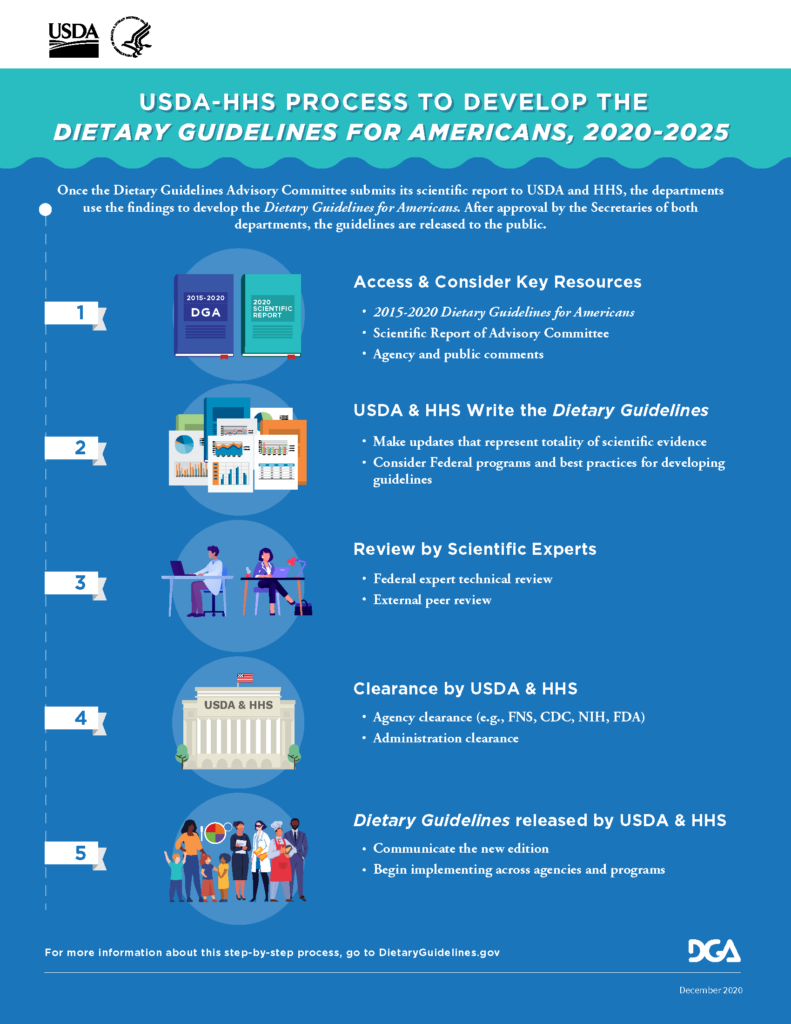By USCA Communications Staff
Oct. 21-22, 2024, marks the seventh and final meeting of the 2025 Dietary Guidelines Advisory Committee (DGAC), composed of 20 nationally recognized nutrition and public health experts appointed by the U.S. Department of Health and Human Services (HHS) and U.S. Department of Agriculture (USDA). Since early 2023, the DGAC has been gathering public input and examining evidence pertaining to a list of prioritized scientific questions, many of which were identified by the HHS and USDA in 2020-22. Public comments were solicited on these questions before appointment of the DGAC and during its deliberations.
In the coming month, the DGAC will finalize and submit its scientific report to the HHS and USDA, which will be posted to DietaryGuidelines.gov for public comment. The report will include the current state of nutrition science and independent, evidence-based advice for the HHS and USDA to consider as they develop the next edition of the Dietary Guidelines for Americans, which are updated every five years. In addition, public feedback will be taken into account.
 Canola oil has been included previous editions of the Dietary Guidelines for Americans as a source of healthy fat due to its excellent composition of fatty acids (building blocks of fat). Canola oil is predominantly composed of unsaturated fatty acids, including 62% oleic acid, a monounsaturated fatty acid, and 9% and 19% of polyunsaturated fatty acids alpha-linolenic acid (omega-3) and linoleic acid (omega-6), respectively. It is also a good source of vitamins E and K.
Canola oil has been included previous editions of the Dietary Guidelines for Americans as a source of healthy fat due to its excellent composition of fatty acids (building blocks of fat). Canola oil is predominantly composed of unsaturated fatty acids, including 62% oleic acid, a monounsaturated fatty acid, and 9% and 19% of polyunsaturated fatty acids alpha-linolenic acid (omega-3) and linoleic acid (omega-6), respectively. It is also a good source of vitamins E and K.
In its 2022 comments to the HHS and USDA, the U.S. Canola Association (USCA) highlighted the health benefits of canola oil in the diet for people of all ages and health statuses based on significant scientific evidence. In particular, it addressed two questions posed about the relationships between food sources of saturated fat and risk of cardiovascular disease as well as between specific food-based strategies during adulthood and body composition, risk of overweight and obesity, and weight loss and maintenance. The USCA highlighted qualified health claims for canola oil and high-oleic canola oil on their ability to reduce the risk of coronary heart disease when used in place of saturated fat. The USCA also called out a study in which canola and high-oleic canola oils were shown to lower abdominal fat by 1.6 percent as well as risk of metabolic syndrome when used in place of three other types of oils in a heart-healthy diet for weight maintenance.
The 2025 DGAC examined nutrients and/or dietary components that present a substantial public health concern because of under- or over-consumption. Vitamin E is a nutrient that is often under-consumed. In fact, it has a prevalence of inadequacy of 84% (food only) compared to the estimated average requirement, per the 2005-16 National Health and Nutrition Examination Surveys. Vitamin E usual intake is 9 mg but the recommended amount is 15 mg per day for both genders ages 14 and up. Canola oil can help Americans get adequate vitamin E because it provides 2.4 mg of this nutrient per tablespoon.
In summary, canola oil is an effective and affordable source of healthy unsaturated fat. It fits well into dietary patterns across life stages, helps reduce the risk of heart disease when used in place of saturated fat and can contribute to increasing American intake of vitamin E. Hopefully, these facts will be reflected in the Dietary Guidelines for Americans 2025-2030.